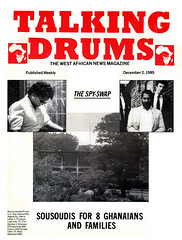What The Papers Say
People's Daily Graphic, Ghana, November 8, 1985
Exiles under pressure
As Ghanaians may be aware, there are some exiles who hurriedly left the country soon after 31st December, 1981 even though nobody was looking for them and no specific charges were made against them.In some cases, their unceremonious departure was the result of a guilty conscience, and they thought that even if their misdeeds had not yet been uncovered, they might come to light, and in that case the best place to be was elsewhere.
Others, often substantial businessmen, had clear consciences but were conditioned by their class attitudes to assume that anything bearing the name of "revolution" spelt automatic doom to anyone of substantial wealth whether honest or otherwise, and so they left.
As time has passed and the country is obviously picking up economic momentum, the thoughts of these self-exiles naturally turn towards home. Many have already returned, and some of these have been vetted, have paid reparation for any anti-social omissions and commissions, and have settled down once more.
But there are still considerable numbers of Ghanaians abroad. wishing to return home, and yet are being prevented from doing so by misinformation about conditions here.
It is easy enough to understand one of the major sources of misinformation or rather, deliberate disinformation. This comes from those exiles who are actively working against our young revolution. Those whose selfish ambitions have been thwarted, and those whose avenues for illicit enrichment have been blocked, and who still hope to turn back the clock and undo all that we have painfully achieved, so that they can once more take their places at the helm of affairs which they regard as their special preserve.
It suits their interests to disinform their fellow Ghanaians abroad to spread horror stories, lies and ridicule about the people, the process and the structures which are slowly but surely raising this country out of the mess into which some of us helped past cynical regimes to plunge it.
But the GRAPHIC has been drawn to a different category of vendors of disinformation. These people are here in Ghana, and they are benefiting from the absence of certain self-exiled businessmen and therefore they want to prolong their absence as long as possible whilst they grow fat on the business enterprises which have been left behind.
If a businessman left the country in a hurry, he would have handed over the responsibility for managing and overseeing his affairs here to associates, friends or relatives who he presumably trusted. But it seems that some of them have betrayed that trust, and are now, in the atmosphere of economic recovery, doing very nicely for themselves, and at the same time trying to frighten the rightful owners from returning by sending them stories of the dreadful things which may happen to them if they dare to return.
Meanwhile, the story tellers are happily stashing away their benefactors' monies, sometimes with the support of some who like to think of themselves as "pillars of society".
The GRAPHIC hopes that those involved in this cheating act will get the message. People are watching and are beginning to talk.
The new passport regulation
National Concord, Nigeria, November 21, 1985
Nigerian diplomatic missions have been instructed to stop issuing passports to Nigerians abroad. According to the Minister of Internal Affairs, Lt. Colonel John Shagaya, the measure was adopted by the Federal Military Government to put a stop to abuses of Nigerian passports abroad.The minister noted that some Nigerians abroad, particularly students, sell their passports to nationals of other countries who then use the passports for fraudulent purposes, thereby smearing the image of Nigeria abroad.
While we would not quarrel with or challenge any reasonable measure by the government designed to protect the nation's security or promote the image of Nigeria, it is important, however, that the implications of such measures be carefully considered before implementing them.
A policy must be considered not only in the light of its ability to solve a perceived problem, but also in light of the possibility that it may create new and unnecessary problems or add to existing ones. If the government stops issuing passports abroad, there is no doubt that the measure will create problems for Nigerians abroad in particular, and Nigerians at home in general.
In adopting the policy of requiring Nigerians abroad to obtain new passports only in Nigeria, the government's action may have been misdirected. The government should spend more time devising measures to alleviate the economic predicament of Nigerian students abroad, since Nigerian students who sell their passports may be doing so to redeem their woeful economic situation. The new government measure will only push these students to find other fraudulent, and probably more damaging ways to sustain themselves.
Even at home, the new measure is bound to create problems for Nigerians. Already, the red tape-ism involved in obtaining a new passport in Nigeria is enormous. If Nigerians abroad are then required to return home to renew or obtain new passports, that would no doubt further congest passport offices and add to the frustration currently experienced by passport seekers at home. Such an atmosphere is also good ground for corruption.
While we may sympathise with the objective of the government in wanting to adopt the new measure, it is important, however, to ensure that in the attempt to solve a problem, new ones are not created. The government may find that it has to look for other ways to combat the problem of Nigerians selling their passports to nationals of other countries. There is no doubt that it is a practice that should be discouraged, but not at the expense of well-meaning Nigerian students abroad.
...
FOR OPINIONS THAT CHALLENGE
YOUR BELIEFS WHERE ELSE BUT IN TALKING DRUMS
